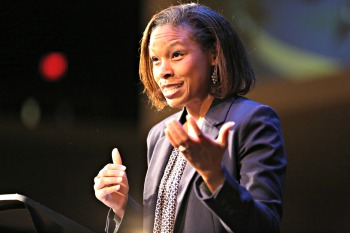Speakers at the RISK conference discussed how the church much address culture.

Trillia Newbell, consultant for Women’s Initiatives, Ethics & Religious Liberty Commission
During the Feb. 24 RISK Conference in Louisville, TC Taylor, Russell Moore and Trillia Newbell tackled the issues of how the culture is invading the church, how the church should engage the culture, and what Jesus would do.
Taylor, who planted New Breed Church in Louisville’s West End in 2013, cautioned pastors about the danger of culture invading the church when the style of the message is more important than its content.
“If you are more concerned about how do I get people in the door than making sure that you’re clear on what the gospel of Jesus Christ is, then you are in danger of allowing worldliness into your church,” Taylor warned.
“(W)orldly wisdom creates crowds, not congregations of people who are convicted by the gospel,” he observed.
Churches are also in danger of being invaded by culture when “our ministry is about man’s wisdom and not God’s power,” he said.
Noting that Paul did not speak with “a silvery tongue, flattery, or wow-you-kind-of-thing,” but with the power of the Holy Spirit, Taylor affirmed, “The message of gospel has power in it.”
“The same gospel (that changed your life) has the same power to save everybody in your community,” he reminded the pastors.
Ethics & Religious Liberty Commission President Russell Moore asserted that the most dangerous cultural questions are the ones that aren’t being asked by the church.
“Sometimes we assume that engaging culture ought to be driven by whatever is trending on Facebook, � the ones that are the most controversial or the most talked about at the time,” Moore observed.
Although those perils and dangers should be addressed, the most dangerous cultural questions are those which “we are either not asking because we’ve already surrendered a biblical understanding of those things, or because we do not see what is lying in front of us on the mission field in the next several years.”
The church cannot engage the culture with just a superior form of morality, Moore advised. “We must engage the culture with Christ.”
The church, however, should not see lost people as enemies, he added. Rather, “we should see lost people as we were and exactly as we would be apart from the Spirit of the living God. “
Newbell, a consultant on women’s initiatives for the ERLC, urged church leaders to first “make sure our motivation is love.” The question is not, “What would Jesus do?” But rather, “What did Jesus do?” she said.
Jesus acted with authority, boldness, bravery and courage,” she observed.
Urging Christians to respond in love, she noted that Jesus wasn’t just bold, but also deeply compassionate. “His heart was moved with compassion for the weak, the helpless, the needy, for those who ultimately needed Him, for you and for me,” she said.
“What Jesus calls us to is a life of conviction, kindness, love and sacrifice,” she concluded. (WR)
Todd Deaton